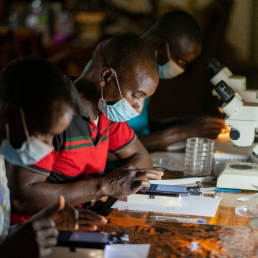Innovation & Design
This practice area takes an interdisciplinary approach, bringing together faculty with varied expertise to innovate and develop solutions to the most intractable public health challenges.
As a Center, we have a 'bench-to-community' approach to developing products and systems; iteratively developing tools with communities, systematically testing them in real-world settings, and implementing and assessing them in partnership with ministries and partners.

Relevant Projects

VIRA: A natural language processing chatbot
At the cusp of COVID-19 vaccine authorization for US adults aged over 18 years, we developed a web-based chatbot with an illustration of a smiley emoji in warm orange and yellow tones, embodying a friendly bot presenting credible facts about COVID-19 vaccines. The chatbot, called Vira, short for Vaccine Information Resource Assistant, was available on a website, accessible on WhatsApp, and embedded in several other websites, such as city health departments, via an embed code snippet. IBM Research developed and managed the chatbot’s backend, which is based on a neural model that maps each user utterance to (at most) one concern from a predefined list of concerns.

VectorCam: Innovation to Advance Entomological Surveillance
A portable, easy-to-use field tool that allows entomologists to accurately speciate different mosquito species to help malaria intervention efforts.
Digital Wellbeing in Saudi Arabia
To develop and evaluate a prevention intervention around digital wellbeing tailored to Saudi Arabia that will inform global efforts in digital wellbeing.
Design and development of a serious game for public health training
As a part of its capacity-development work, JHU under its Uttar Pradesh Health Systems Strengthening Support Project (UPHSSSP) proposes to develop and roll out a digital game for public health managers with the goal of enhancing their understanding of public health core competencies.
mHealth Intervention via Mentors: Preventing Substance Use, Sexual Risk and Violence among Inner City Youth through Technology-Enhanced Mentoring
This research focuses on using technology-enhanced youth mentoring to prevent substance use and promote mental health among urban, racial minority adolescents.
